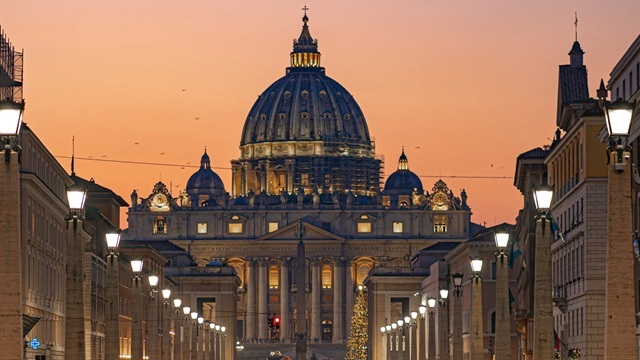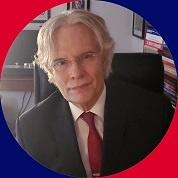 The Church’s Moment for Reparation
The Church’s Moment for Reparation
The death of Pope Francis concludes a controversial twelve-year reign as Bishop of Rome. As the Catholic Church prepares to name the 267th pope within the next few weeks, it is paramount to understand all that is at stake. Francis’ stewardship of the Church has presented man-made monumental challenges to the institution. The threat of schism has been real, because of the policies that he put in place or advocated for.
The Catholic Church is the largest Christian denomination in the world. Christianity is the biggest religion on the planet. Western civilization and its institutions, customs, and ethics were built upon Christianity as a religion and the Judeo-Christian values it subscribes to. This is why the person who is elected the next successor of St. Peter impacts everyone, not just Catholics. An understanding of the enormous shortcomings of the first Jesuit pope’s tenure is critical to appreciating this situation.
Pope Francis personified Vatican II (1962–1965). The Second Vatican Council (or Vatican II) was a consequential moment for the Catholic Church. It sought to “update” its teachings and practices for the modern era. It promoted ecumenism, introduced liturgical changes like using vernacular languages for Mass, and fostered dialogue with other religions. Likewise, it was also infiltrated and greatly influenced by communists and Soviet spies and sympathizers.
Vatican II was very political. It produced sixteen documents, including four constitutions, nine decrees, and three declarations. Not a single condemnation was made of communism, even though this was the heyday of the Cold War and communists were committing atrocities on every continent. Before Vatican II, there were at least ten papal encyclicals explicitly condemning, by name, both communism and socialism. None of this seemed to matter to promoters of the Second Vatican Council.
The 1968 Latin American Episcopal Conference (CELAM) in Medellín, Colombia, weaponized communists. The CELAM summit was attended by nearly 250 bishops from across Latin America, along with theologians, priests, and religious and lay experts. The attending bishops called for a “preferential option for the poor” and emphasized that the Church must stand with the oppressed. However, this was not to be achieved by Catholicism’s traditional and historic venues for helping the poor and downtrodden. This was a call for revolution by way of championing systemic structural changes.
Liberation theology played a central role in Medellín. It sought to shape how the Church in Latin America would interpret and enforce Vatican II reforms. Influenced by Marxist analysis and misrepresenting the Gospel, it emphasized that salvation isn’t just spiritual but also involves “liberation” from perceived economic, political, and social “oppression.” Many bishops at Medellín, inspired by this theology, argued that the Church must be actively involved in transforming the existing structures of power. Among the attendees was Archbishop Hélder Câmara of Brazil, a key figure in liberation theology. Additionally, Câmara influenced Klaus Schwab in the early 1970s and helped shape the World Economic Forum’s model for “stakeholder capitalism.” From this realm of revolutionary-minded men, Jorge Mario Bergoglio entered the Church.
The Catholic Church of Vatican II became more immanent and less transcendentalist. The battle for the Church’s soul was launched. Popes John Paul II and Benedict XVI, both having lived under totalitarian regimes, condemned communism and socialism for their atheistic and collectivist foundations. They saw these political religions as being incompatible with Catholic teachings on human dignity, freedom, and private property. Building on earlier papal critiques of materialist models, they also expressed concerns about excessive consumerism and secularism. John Paul II and Benedict XVI neutralized radical interpretations of Vatican II. The arrival of Jorge Mario Bergoglio at the Vatican changed that. The former Archbishop of Buenos Aires launched a war to reverse the course of his predecessors.
Pope Francis did not just emblematically represent the modernist underlaying of Medellín’s 1968 CELAM conference. Latin America’s first pope crossed the threshold from the modern into the postmodern. The open support of and the friendship enjoyed by Francis with Castro-Communism was consistent with his moral and ideological alignment with Marxism. Bergoglio, in his emotional and tactical bond with Latin America’s most formidable Soviet and Neo-Communist base, made clear his ideological pedigree. The ardent defense of globalist schemes such as eco-socialist projects like climate alarmism, promoted by internationalist powers like the UN and the WEF, were among Francis’ pet projects. Attacking Catholicism’s tradition and interrupting the established norms were methodologies employed towards those ends.
The death of Pope Francis has left the Catholic Church in turmoil, with deep divisions surfacing between liberal and conservative factions. The late pope's leftist reforms, including openness to the blessing of same-sex couples, establishing a false equivalency with Islam, and a focus on cultural Marxist interpretations of social justice have alienated a large percentage of the faithful. It is in continents such as Africa and Asia, where conservative readings of Church theology dominate, that Catholicism has witnessed the greatest surge in conversions and devotional practices. By contrast, European churches, which are tended by a more liberal clergy, are empty at times. The post-Vatican II stratagem seems to have shrunken the Catholic flock, the opposite of what its proponents said would happen.
Francis’s centralized leadership style, adopting Peronist traits, unorthodox reforms, and exercising controversial appointments such as Gustavo Zanchetta and Tucho Fernández, both highly problematic figures with questionable moral aptitude, have fractured Church governance. Concerns exist over Francis’s synodality potentially undermining hierarchical authority. The post-Francis Church must establish a balance between the role of the laity while preserving the Magisterium’s authority, ensuring orthodoxy in leadership appointments, and preventing regional synods from fostering theological ambivalence.
Doctrinal clarity must be reaffirmed with the ascension of the next pope. The Church should reaffirm unambiguous Catholic teachings, particularly on sexuality, family, and moral theology, countering ambiguities in Francis’s documents like Amoris Laetitia. Many of Francis’ critics have argued that Catholicism requires adherence to scripture, tradition, and doctrine, not blind obedience to a pope. The late pope’s approaches to notions such as the “brotherhood” with Muslims and the Vatican’s deal with China on bishop appointments or his amorous relationship with communist regimes is unacceptable. Francis attempt to institutionalize the Church’s post-Vatican II shift toward secularization and relaxed teachings are issues of doctrinal lapses that must be addressed.
The militant opposition to the growing traditionalist movement in the Church run by Francis’ papacy, emulating police-state tactics at times, has no place in Catholicism. The restrictions on Traditional Latin Mass, included in his 2021 apostolic letter Traditionis Custodes, are heretical by contradicting a practice that goes back to the 2nd century. Another major issue that questioned Francis’s tenure was his focus on secular issues like migration and the environment, both orthodox themes of the atheistic globalist left. Prioritizing earthly matters and boxing them as existential threats lends many to see paganism rather than a transcendental religion.
God will judge Pope Francis. The Lord is always right, and His will shall be done. For the next pope, an array of issues remains in need of urgent attention. Addressing secularism through robust evangelization efforts rooted in unapologetic Gospel proclamation and cultural engagement is a must. The reverence and beauty of liturgical celebrations have got to return. The affirmation of Catholic doctrine requires the absolute rejection of communism and socialism in any form. Especially its postmodern offspring like Gender Ideology, Critical Queer Theory and other transhuman doctrines. The West must once again be proud of defending its exceptionalism. The Church is God-centered. Radical secularism, communism, and materialism are diversions from the soul’s salvation.
© The CubanAmerican Voice. All rights reserved.
 🖋️Author Julio M. Shiling
🖋️Author Julio M. Shiling
Julio M. Shiling is a political scientist, writer, columnist, lecturer, media commentator, and director of Patria de Martí and The CubanAmerican Voice. He holds a master’s degree in Political Science from Florida International University (FIU) in Miami, Florida. He is a member of The American Political Science Association, The PEN Club (Cuban Writers in Exile Chapter) and the Academy of Cuban History in Exile.
Follow Julio on:
📚Published books 📺In the media 👨🏫 Conferences and Symposiums 🎙️Podcast The Shiling Summary

